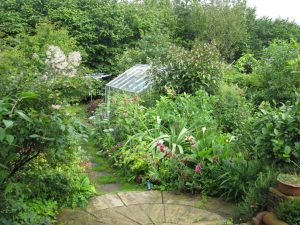Try your hand at some scientific projects, learn about the scientific process and help researchers crunch through masses of data.
.
A lot of us are increasingly into citizen science, with yesterday’s piece on these news pages showcasing Butterfly Conservation’s latest project to get people to observe wildlife – from their back gardens:
Turn to nature for inspiration
.
And on today’s Open Country, we go looking in another back garden:
.
Closed Country: A Spring Audio-Diary with Brett Westwood
 It seems hard to believe, when so many of us are coping with lockdown and more, that the power of nature continues unfettered: Spring, in all its fecundity, is altering our landscape as it always does. To chart this time of great change we gave the naturalist, Brett Westwood, a microphone at the end of March and asked him to record a nature diary. He lives in urban Stourbridge in the West Midlands, which doesn’t sound an obvious setting for a spring journal but actually it’s perfect: What he sees at close quarters, with his expert eye, is available for us all if we know where and how to look. His sightings include feather-footed flower bees who live in the brickwork of our houses, buzzards that might steal frogspawn from your pond, bee-flies which coat their eggs with dust before shooting them at the nests of solitary bees, and mistletoe… which doesn’t sound as intriguing, but it really is: Brett can explain why our behaviour is causing it to spread further than ever before.
It seems hard to believe, when so many of us are coping with lockdown and more, that the power of nature continues unfettered: Spring, in all its fecundity, is altering our landscape as it always does. To chart this time of great change we gave the naturalist, Brett Westwood, a microphone at the end of March and asked him to record a nature diary. He lives in urban Stourbridge in the West Midlands, which doesn’t sound an obvious setting for a spring journal but actually it’s perfect: What he sees at close quarters, with his expert eye, is available for us all if we know where and how to look. His sightings include feather-footed flower bees who live in the brickwork of our houses, buzzards that might steal frogspawn from your pond, bee-flies which coat their eggs with dust before shooting them at the nests of solitary bees, and mistletoe… which doesn’t sound as intriguing, but it really is: Brett can explain why our behaviour is causing it to spread further than ever before.
Closed Country: A Spring Audio-Diary with Brett Westwood | bbc.co.uk
.
Today’s Inside Science, also on Radio 4, takes a specific look at citizen science and projects we can get stuck into during these times:
.
Citizen science on BBC Radio past and present
We like citizen science on BBC Inside Science, it’s an opportunity for anyone and everyone to try their hand at some scientific projects, learn about the scientific process and help researchers crunch through masses of data.
Professor Chris Lintott co-founded Zooniverse, the biggest citizen science platform over a decade ago. He’s a regular on the programme telling us about the latest Muon-hunting, Penguin-counting, galaxy-searching opportunities they offer.
But they’re not the only ones, Butterfly Conservation want you to help them track the timing of butterfly emergence in the UK and Fold.it are asking people to play their protein folding online game to help them find a possible cure for Covid-19.
But back in the 1930’s BBC radio producer Mary Adams was running a series called ‘Science in the Making’, where listeners were invited to participate in, what would now be called ‘citizen science’ experiments. With topics as diverse as charting the timing of blackbird egg laying and deciphering the meaning of dreams, a scientist would explain their hypothesis and ask the audience for help. Allan Jones, a senior lecturer in computing and communications from the Open University has been digging into the BBC’s earliest public science experiments, and the woman who decided to broadcast them.
.
With related links:
- Zooniverse (www.zooniverse.org)
- Fold it (fold.it)
- Butterfly sightings (butterfly-conservation.org)
- Follow Chris Lintott (twitter.com)
- Follow Marnie Chesterton (twitter.com)
.
photo: File:Back garden – Flickr – peganum (3).jpg – Wikimedia Commons